Making 'people-first AI' the future normal.
Plus some reflections from Riyadh.
I’ve spent much of the last two weeks travelling – first to Brazil for a AI & CX conference and then spending a few days in Riyadh at the Future Hospitality Summit – at both events I’ve helped participants visualise what a people-first AI strategy could look like.
This trip was also memorable because it was my first time in Riyadh. I wasn't completely sure what to expect – we read a lot about the Saudi’s ambitions, but it was interesting to experience the city first hand.
Scroll down to read some of my reflections, especially on where (my) reality differed from what you typically hear online.
On AI, robots and creating a future normal we want
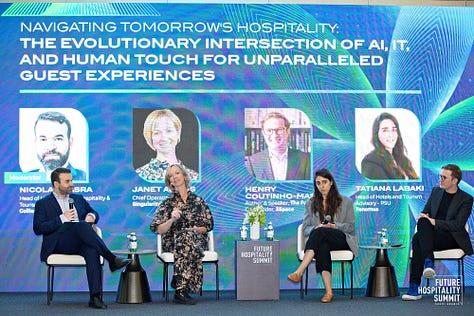
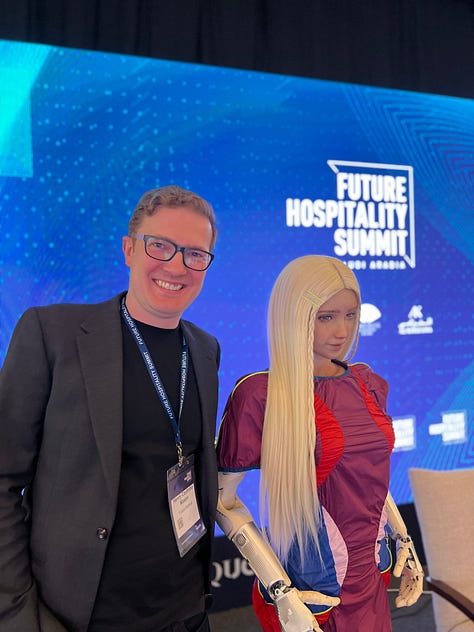

The AI industry has a big PR problem. My 'People-First AI' message continues to resonate deeply with audiences. I had countless people come up to me to share their relief at seeing positive examples of how people are using tech to improve jobs, make us more human, and create a better future normal. We’ll have made progress when ‘people-first AI’ doesn’t sound like a paradox.
Why are we still making hyper-sexualised robots? I loved SingularityNET’s Janet Adams' energy and optimism during our panel; but I couldn't help be disappointed that their humanoid robot pop star, Desi, looks like a 1950s Barbie doll (only without legs, which makes her even more creepy). The robot industry is sleepwalking into an even bigger PR problem.
It's hard for us to imagine new jobs. I had a fascinating conversation with Desi's stylist; who might well be the world's first robot stylist. Interestingly she'd studied fine art, rather than any technical subject. I suspect AI will change the value of knowledge in some very non-obvious ways.
On Riyadh and Saudi Arabia
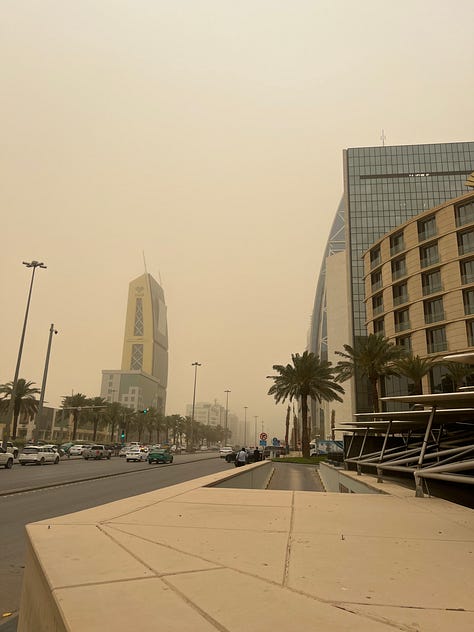
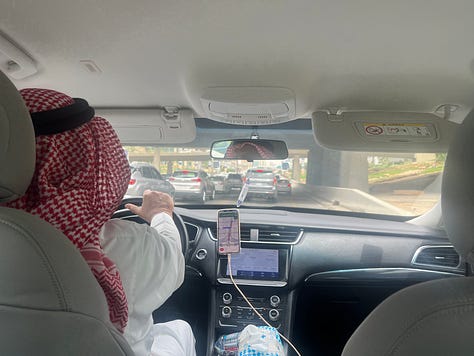
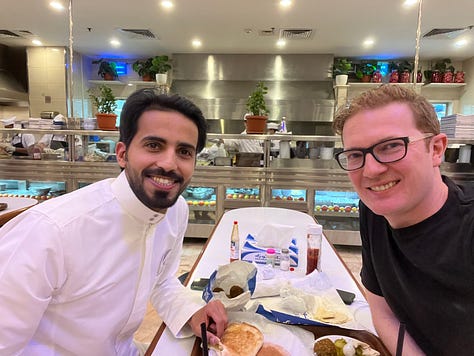

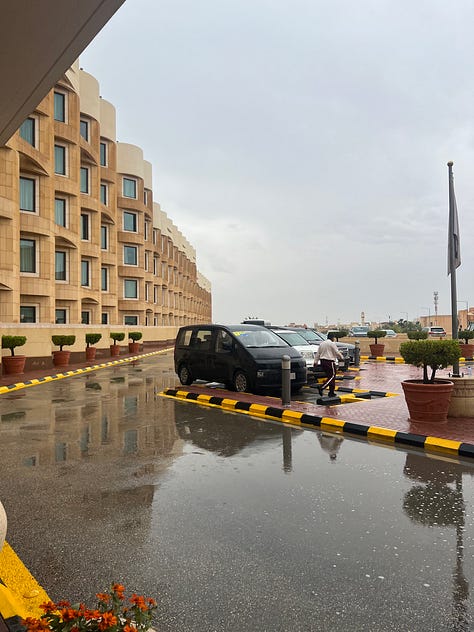
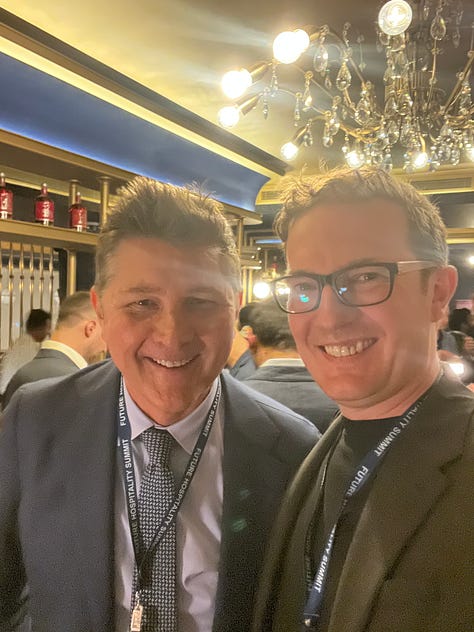
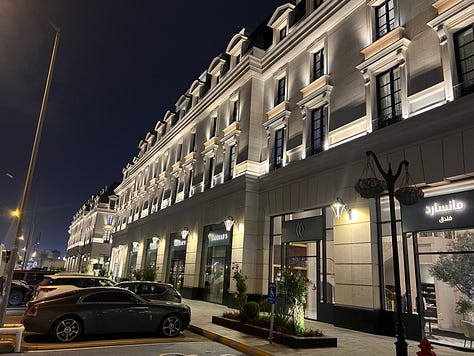

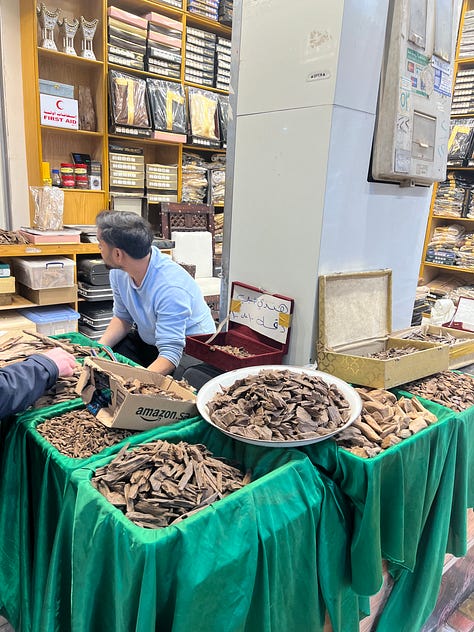
In general, it was far less extravagant than I was expecting. Yes, the flagship hotels are amazing, but the streets are more like Mumbai or Marrakesh than Dubai or Singapore. That’s not a negative, it feels way more 'real'. Like all trends – hype comes fast, change happens more slowly.
But the traffic 🚙🚙🚙 ... public transport is a luxury we should celebrate more.
The Saudi people really are as welcoming as you've heard. Yes, a lot of workers are foreign nationals, but the local Saudis I met seemed genuinely happy we were there.
I felt completely safe. So much so that I took Ali, my Uber driver, for a shawarma on my way back to the airport. I've never felt the urge to do this anywhere else before, but the hour and a half we spent chatting was one of the highlights of my trip.
You feel the effort and ambition everywhere. I dropped into The Garage, an enormous 28,000 sq m startup hub, on a random Monday evening and there were not one but two innovation events taking place. Money won’t guarantee a culture of success, but it lays a foundation. It was also notably more relaxed here – there were lots of mixed sex groups, and many of the women in the room wouldn’t have looked out of place in any global coworking space, which I’m told would have been unthinkable a few years ago.
Everyone loves MJ. 🕺🏽 Listening to an Arabic remix of Michael Jackson would have been pretty low down on my pre-trip bingo card.
Amazon delivery boxes are everywhere. Just as you can get a bottle of Coca Cola in the most remote cafe, anywhere in the world – I was amused to see an Amazon.sa delivery box in the souk.
Always check the forecast! Far from 35C heat, it rained for much of my trip. Surprising, but very welcome. I heard a few rumours that the Saudis are using cloud seeding to change the weather. This seemed fantastical when we wrote about in The Future Normal, but already far less so today.
Humans are hardwired to want what we can't have. I don't usually even drink that much, but not being able to drink really makes you crave a cold beer / glass of wine. Although not drinking while traveling definitely has its advantages 😅
Caveat: the plural of anecdote is not data. I was in the country for a mere three days, mainly at a conference. The tiny slice I saw might be completely unrepresentative. But it was an inspiring reminder of why travel is important. Brazil and Saudi couldn’t be further apart on many cultural metrics, but everyone wants the same things – to build a better life for themselves and their families. Make that your North Star and you won’t go far wrong.
What’s Your Future Normal?
I have delivered 150+ actionable keynotes and workshops for clients in 30+ countries, with consistently exceptional feedback and repeat bookings.
As well as public conferences, I bring fresh and relevant perspectives on what’s next to leadership teams at the world’s biggest companies – such as J&J, Calvin Klein, HP, Mastercard, the Tata Group, and many more.
Here’s what clients say:
“My go-to speaker for future-gazing grounded in reality is always Henry … free from the BS and hype that's often prevalent in this space!” Founder, MAD/Fest
“Thank you for bringing out-of-the-ordinary ideas to this team of smart, motivated people.” VP, Executive Leadership Development, HP
”Constantly provoking, Henry helps us push the boundaries of our innovation thinking” SVP Digital Services, Mastercard
To discuss your next meeting or event then please reach out directly to Renee Strom or check out my speaking site.
Thanks for reading,


A wonderful re-frame - indeed, a 'people-first AI' seems like a natural way to approach a technology that has a tremendous transformative potential, and can probably be best adopted when in the service of humanity;